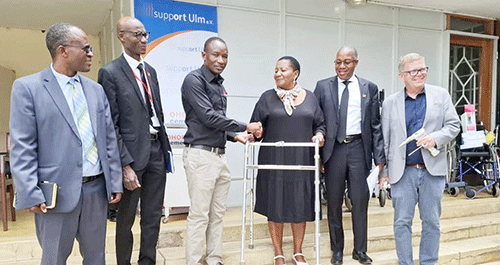Orthopaedic surgeon Dr Tufikifa Nakale said the medical world has embraced technological advancements, and Namibia needs to be proactive in performing frequent minimally-invasive surgeries so that patients can recover quickly.
He said the German government’s donation of equipment makes a great difference, making his work more efficient, and adding great value to the healthcare sector.
“We have to do minimally-invasive surgeries, especially for the knees and shoulders, with small incisions so that the patient, can recover quickly and go back to work. This means less pain to the patient and quick recovery,” he said.
Deputy health minister Esther Utjiua Muinjangue said without reliable infrastructure, Namibia’s healthcare professionals are left without the necessary resources to carry out their vital duties effectively. Hence, health infrastructure and medical equipment stand out as fundamental pillars.
“The provision of high-quality medical equipment empowers our devoted health workers, enhancing their capability to deliver care that meets the needs of every patient. It will undoubtedly improve patient experiences and outcomes, echoing the standard of healthcare we aspire to uphold across our nation,” she added. The donation, valued at N$2 million, comprises hospital beds, wheelchairs, walking aids and various orthopaedic instruments for the Katutura Intermediate Hospital.
“These essential tools are set to transform the way we provide healthcare, ensuring that our health professionals are equipped to offer the highest quality services to our beloved communities,” stated Muinjangue.
She added: “One of the key takeaways from that unprecedented global public health crisis has been the pressing necessity to strengthen the building blocks of our health system. Among these, health infrastructure and medical equipment stand out as fundamental pillars. Without reliable infrastructure, our healthcare professionals are left without the necessary resources to carry out their vital duties effectively”.
The provision of high-quality medical equipment empowers our devoted health workers, enhancing their capability to deliver care that meets the needs of every patient. Muinjangue said it will undoubtedly improve patient experiences and outcomes, echoing the standard of healthcare they aspire to uphold across the nation.
“Public-private partnerships such as this are paramount. They leverage resources, technology, expertise and an expanded network of support, creating resilient and adaptable health systems. The symbiotic relationship between government bodies and private organisations like Ohorongo Cement, and non-profit organisations such as Support Ulm e.V., exemplifies a model of mutual benefit and sustainable impact,” she stated. -psiririka@nepc.com.na



